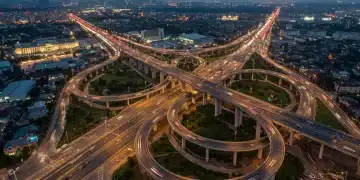Insights on renewable energy expansion: energizing our future

Insights on renewable energy expansion highlight the importance of emerging technologies, community involvement, and smart grid development as key drivers toward a sustainable future with cleaner energy solutions.
Insights on renewable energy expansion show how this movement is transforming our planet’s future. Are you curious about what drives this change and how it may impact your daily life? Let’s dive in!
Understanding the importance of renewable energy
Understanding renewable energy is essential for our planet’s future. This type of energy is derived from resources that are naturally replenished, such as solar, wind, and hydro power. By harnessing these resources, we can reduce our dependence on fossil fuels and combat climate change.
The Benefits of Renewable Energy
Using renewable energy presents numerous advantages that contribute to a healthier planet and society. Some key benefits include:
- Lower greenhouse gas emissions, leading to less pollution.
- Job creation in new energy sectors.
- Energy independence and security for nations.
- Stable energy prices as resources become more abundant.
Moreover, adopting renewable energy technologies supports long-term sustainability. For instance, solar panels convert sunlight into electricity, making it easy for homeowners and businesses to generate their own power. Wind turbines, similarly, utilize wind currents to produce energy, showcasing how natural forces can be turned into usable resources.
The Role of Government and Policy
Governments play a vital role in promoting renewable energy. Policies and incentives can encourage the shift towards cleaner energy sources. Many countries have set ambitious targets to increase their renewable energy capacity, demonstrating a collective commitment.
In addition to government action, public awareness is crucial. When communities understand the importance of renewable energy, they are more likely to support positive changes and adopt sustainable practices. Schools and organizations can help by educating individuals about energy conservation and promoting renewable options.
Finally, investing in renewable energy not only benefits the environment but also facilitates economic growth. As technologies improve and costs decrease, the use of renewable sources will become more accessible to everyone. It is an exciting time as society moves towards cleaner, more sustainable energy solutions.
Innovations driving renewable energy expansion

Innovations in renewable energy are transforming how we generate and use power. These advancements not only improve efficiency but also reduce costs. By embracing cutting-edge technologies, society can harness energy that is cleaner and more sustainable.
Solar Energy Innovations
Solar panels have come a long way. New materials and designs increase their energy conversion efficiency. For example, bifacial solar panels capture sunlight on both sides, enhancing output significantly. Another innovation is solar tracking systems that adjust panel angles to maximize exposure to the sun.
- Improved efficiency of solar cells.
- Affordability of solar installations.
- Integration with building designs.
As solar technology advances, installation costs have dropped, making solar energy more accessible to homes and businesses. These developments promote the adoption of solar as a primary energy source.
Wind Power Advancements
Wind energy also sees major innovations. Taller wind turbines capture more wind at higher altitudes, increasing energy production. New aerodynamics in blade design allow turbines to operate in varying wind conditions.
Furthermore, floating wind farms are emerging, enabling wind energy capture in deeper waters where winds are stronger and more consistent. This expands the possibilities for wind energy generation.
Innovations such as smart grid technology play a crucial role in integrating renewable energy sources. These systems enhance energy distribution, manage demand, and promote efficient use of resources. Renewable energy can flow seamlessly, providing reliability and stability to the grid.
Overall, the innovations driving the expansion of renewable energy are key to achieving sustainability goals. They offer exciting opportunities for growth while reducing our environmental impact.
Challenges and solutions in renewable energy
Challenges in renewable energy are important to address to ensure a sustainable future. One major issue is the intermittent nature of sources like solar and wind energy. These energies do not produce consistent power since sunlight and wind strength can vary. However, there are solutions that help manage these fluctuations.
Energy Storage Solutions
Energy storage technologies are vital for balancing supply and demand. Among these, batteries are the most common solution. Advances in battery technology, such as lithium-ion batteries, have improved efficiency and storage capacity.
- Integration of battery storage systems with renewable energy sources.
- Development of pumped hydro storage for large-scale energy needs.
- Exploration of new materials for better battery performance.
These storage solutions allow excess energy generated during peak production times to be saved for later use.
Grid Infrastructure Improvements
Another challenge is the grid infrastructure, which often struggles to handle the shift to renewable energy. Upgrading power grids to accommodate new energy sources is crucial. Smart grids can optimize energy distribution and enhance reliability.
By using smart technologies, we can manage energy flow more efficiently and ensure that renewable energy is effectively utilized. This approach supports both energy security and sustainability.
Policy support also plays a key role in overcoming these challenges. Governments can create incentives for renewable energy projects, helping to fund research and scale solutions. Public engagement and education about the benefits of renewable energy can foster community support and drive change.
Through innovative technologies and supportive policies, we can tackle the challenges in renewable energy and pave the way for a cleaner, more sustainable future.
The future of energy: trends and predictions

The future of energy is exciting, marked by innovative trends and predictions that promise a sustainable world. With climate change raising awareness globally, more people are advocating for renewable energy solutions. As we look ahead, it’s clear that a focus on clean energy sources will shape our energy landscape.
Emergence of Smart Grids
One major trend is the development of smart grids. These advanced systems make energy distribution more efficient by using technology to manage electricity flow. Smart grids can respond to real-time energy demands and integrate various renewable energy sources.
- Improved energy efficiency and reduced waste.
- Enhanced reliability and resilience against outages.
- Support for electric vehicle charging infrastructure.
This transformation helps to create a more responsive and flexible energy network that can adapt to changes in consumption patterns.
Growth of Decentralized Energy Systems
Decentralized energy systems are also gaining traction. Instead of relying on large power plants, communities can produce their own energy through local resources like solar panels and wind turbines. This shift encourages energy independence and reduces transmission losses.
Many communities are already taking advantage of microgrids. These small-scale energy systems enhance local resilience, especially in remote areas or during emergencies. By utilizing local resources, communities can power themselves in a sustainable and cost-effective manner.
As energy storage technologies advance, we can expect battery systems to become an integral part of our future. Homeowners with solar panels will rely on efficient batteries to store energy for use at night or during cloudy days. This improvement increases the reliance on renewable energy and decreases dependence on fossil fuels.
Looking ahead, we must also consider technological innovations. Advances in energy efficiency, such as better appliances and building materials, will play a crucial role in reducing energy consumption. By using less energy, we can maintain a smaller carbon footprint while still enjoying modern conveniences.
The future of energy is bright and full of promise. As we look ahead, innovations in renewable energy will help us create a cleaner, more sustainable planet. Trends such as smart grids, decentralized energy systems, and advanced energy storage solutions are paving the way for a new energy era. By embracing these changes, we can move towards energy independence and environmental protection. Community involvement and supportive policies will also play significant roles in this transition. Together, we have the power to shape a greener future for everyone.
FAQ – Frequently Asked Questions about Renewable Energy
What are the benefits of renewable energy?
Renewable energy reduces greenhouse gas emissions, promotes energy independence, and creates jobs in new sectors.
How do smart grids improve energy use?
Smart grids enhance efficiency by managing electricity flow in real-time, integrating renewable sources effectively.
What role does energy storage play in renewable energy?
Energy storage allows excess energy produced during peak times to be saved for later use, ensuring a consistent supply.
How can communities participate in renewable energy projects?
Communities can create local energy systems, support renewable projects, and advocate for policies that favor sustainable practices.





